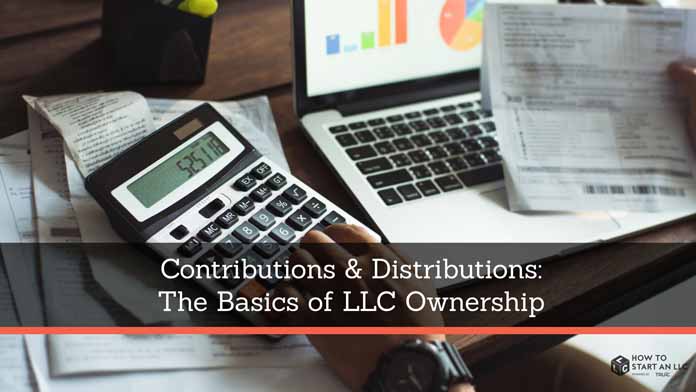As Owner Of Llc Can I Withdraw Money
Contributions & Distributions
The Basics of LLC Ownership
Since there are few restrictions on member status for LLCs, it can be easy to lose track of where responsibilities lie. When a new member makes a contribution, you need to understand what their ownership will entail.
This article details what is considered capital contribution, what that means for your members, and what options your members have with their investment.
Recommended: For personalized help with finding the best scenario for your LLC, schedule a free consultation with a business accountant.

Who are the Owners in an LLC?
Owners of an LLC are referred to as members. Typically, an LLC member is anyone who has contributed capital to the business. An LLC may be owned by one person or many. It can also be owned by virtually any other organization, such as a corporation, another LLC, or a holding company.
There are no restrictions on the number of members an LLC may have or their country of citizenship. Generally speaking, the only limitation put on LLC members is that they must be at least 18 years of age.
What Counts as a Capital Contribution?
A capital contribution is an investment an LLC member makes in the company. When an LLC is formed, each member will typically make a capital contribution to cover start-up expenses. This contribution can be for any amount.
While most capital contributions are made in the form of cash, it is also possible to gain membership in an LLC by contributing property or services. Before making non-cash contributions, you will have to determine the market value of the property or service you are contributing.
Types of Capital Contributions
There are three main ways to secure capital contributions to your business: equity investments, debt investments, and convertible debt.
- Equity investment. When you receive an equity investment, an investor contributes funds to your business in exchange for a stake in your company. Equity investments are an attractive option to business owners because they provide funding that does not need to be repaid. While accepting these investments means giving up a portion of your LLC's earnings, it can also mean bringing on well-qualified partners who are motivated to help your business succeed.
- Debt investment: A debt investment is simply a loan you accept to get your business up and running. This is the most common form of capital for new businesses. Generally, a business owner will set an interest rate they are willing to pay and a general time frame for repayment when seeking out debt investors. To receive a debt investment, you will usually need some collateral to back up your loan. While it's possible to receive a loan without it, lack of collateral will often limit the amount of money you're able to secure.
- Convertible debt:This is essentially a combination of the other two options. When a business owner takes on a convertible debt they accept a loan while agreeing to either repay the money or convert the debt into equity at some time in the future. Typically, the business owner will offer a discount of 20% to 25% when the debt is converted to equity, meaning a $1 million investment could potentially yield $1.25 million worth of equity at the time of conversion.
Capital Contributions and Ownership Details
Anyone who makes an equity investment into an LLC becomes an owner, or member, of the LLC. An LLC member is given rights to the profits and losses of the company, the right to vote on member resolutions, and a series of other rights and responsibilities as laid out in the LLC's operating agreement. The operating agreement should outline each member's contribution, percentage of ownership, and profit allocation, as well as what will happen if they choose to leave the company.
Percentage of Ownership
The percentage of ownership each member has in an LLC is called a unit. While an LLC member's percentage of ownership is typically based on how much capital they contributed, this is not required. Unlike a corporation, an LLC can allocate ownership in any way it sees fit.
Members may consider a number of factors beyond capital contributions, such as the role each member takes in running the company. An LLC may also establish different classes of ownership to shape profit allocation or voting rights. These decisions should be clearly laid out in your company's operating agreement.
Management Responsibilities
When it comes to the structure of an LLC, there are two main choices: member-managed and manager-managed. In a member-managed LLC, all members take an active role in the business of the company and can act as agents of the LLC. In a manager-managed LLC, members appoint a manager to run the daily operations and act as an agent of the LLC. This role may be given to one or more members of the LLC or to a third party. Depending on state regulations, a third-party manager can even be a corporation or another LLC.
Profit Allocation
In multi-member LLCs, profits are allocated at the end of the company's fiscal year. Ownership percentage is the default method for determining profit allocation. If a member has a 25% ownership interest, then that partner will be allocated 25% of the profits at the end of the fiscal year.
However, this method of allocation is not set in stone by the state. LLC members may choose a different method of allocating company profits. For example, if an LLC accepted both cash contributions and service contributions, members may decide to pay out a higher percentage of earnings to the cash contributors until their investments are repaid. As an LLC grows and evolves, it can make changes to how its profits are allocated.
Member Exit Procedure
Your LLC will spend a good deal of time pinning down the details of membership rights and responsibilities. While this should rightly be given sufficient attention, it is also vital to lay out the procedure involved when a member wishes to exit the LLC. There are generally three methods of withdrawing from an LLC that should be addressed in your operating agreement:
- Membership transfer: Your operating agreement may allow a departing member to transfer all or part of their membership to another member.
- Membership sale: You may also provide for the sale of an LLC's membership stake to other members or other individuals or companies. Generally, current members will be given the right of first refusal before the sale is open to external buyers. Your operating agreement should outline the requirements for membership sales.
- Death or incapacitation: Finally, every LLC operating agreement should address what will happen if a member dies or becomes incapacitated. This should include how the member's ownership interest will be distributed or whether it will be inherited through the member's estate.
The process for withdrawing from an LLC will vary, but a withdrawing member will typically be required to:
- Review the LLC's operating agreement
- Provide written notice to the other members of the LLC citing the applicable provision of the operating agreement being followed
- State desired compensation and how it should be distributed
- Provide the date, time, and other details of the withdrawal
- Request a vote from the members to approve the withdrawal
- Accept compensation
- Sign a release confirming you have received proper compensation
When and How Can I Take Out Money?
When and how an LLC member can take money out of their business depends on how your business chooses to be taxed. An LLC may be taxed as a sole proprietorship or partnership, a C corporation, or an S corporation.
- Sole proprietorship/partnership: This is the default tax setting for an LLC. Rather than taking a salary, each LLC member will take distributions from their individual capital accounts. These accounts are where each member's portion of the business profits are held. How much and how often funds can be withdrawn will be stipulated in your operating agreement. The owners of single-member LLCs can make withdrawals as they see fit, as long as they leave enough money in the business to support day-to-day operations. Because these distributions are not considered paychecks, no federal or state taxes are deducted. However, all distributions will be considered personal income and be reported on each member's personal tax return. These earnings are subject to state and federal taxes as well as self-employment tax at the time of filing. LLC members should pay quarterly estimated taxes on this income to avoid additional fees.
- C corporation: If you elect to be taxed as a C corporation, LLC members may be hired as employees and paid what is considered a reasonable salary by your industry's standards. Unlike dividend payments, any business income paid out as a salary is deductible for corporate tax purposes, so it will not be subject to double taxation. However, any payouts beyond this salary are taxed as dividends - both at the corporate rate and the individual rate but are not subject to self-employment tax.
- S corporation: Like a C corporation, S corporations allow LLC members to be paid as employees of the company, receiving a reasonable salary that is subject to all employment and payroll taxes. Unlike a C corporation, any additional dividends paid out to members are subject to pass-through taxation rather than corporate taxation. This means that employees will report all dividend earning on their personal tax return, but will not be required to pay additional corporate taxes or self-employment taxes on this income.
The taxation structure and payment method your business chooses will depend entirely on which option provides the most financial benefits. This can be a complicated decision and should be made under the advisement of a tax professional.

FEATURED ARTICLES

How to form an LLC

What is an LLC?

What is a Registered Agent?

LLC Taxes
As Owner Of Llc Can I Withdraw Money
Source: https://howtostartanllc.com/form-an-llc/contributions-and-distributions-the-basics-of-llc-ownership
Posted by: alcantarlexiskings.blogspot.com

0 Response to "As Owner Of Llc Can I Withdraw Money"
Post a Comment